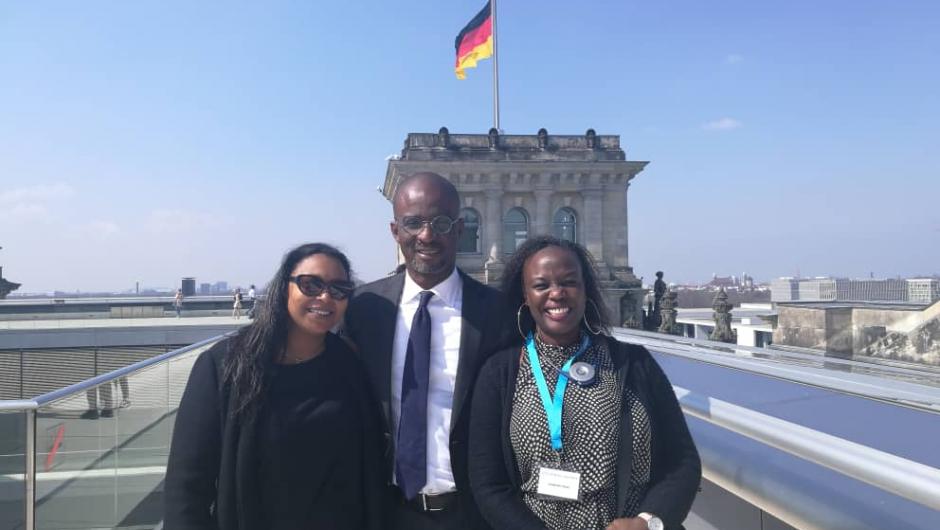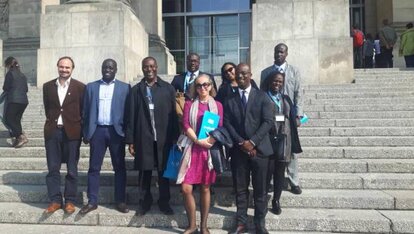Is Africa the Investment Location of the Future?

Ivorian entrepreneur Stanislas Zézé is the founder and CEO of ratings agency Bloomfield Investment Corporation in Côte d’Ivoire. Mr. Zézé was one of the participants of the FNF programme on "Promoting Private Investment in Senegal and Côte d'Ivoire", which took place on 7 - 14 April 2018 in Frankfurt and Berlin. This event took in the context of FNF’s ongoing work focusing on promoting private investment and entrepreneurship in Africa. It also builds on the 2017 FNF conference, entitled "start up Africa - Making the African economy strong", which rightly paves the way for this topic. Mr. Stanislas Zézé sheds some light on the economic prospective for Côte d’Ivoire and Africa as a whole in this informative question and answer session with FNF’s Ekaterini Georgousaki.
How would you describe the current framework conditions for private investment and entrepreneurship in Côte d’Ivoire? What are the main challenges?
The business environment is actually conducive to investment. A couple of laws have been put in place to consider the environment but obviously you have a problem with the application of the measures because the communication from the government on those measures is a problem. Then you have another problem with bottleneck of the administration. We have an entity that has been created that is supposed to facilitate the creation of companies. The state can do that in four hours but the problem is that a lot of entrepreneurs who start businesses don’t know where to go or who to talk to, so a lot of organisational problems exist. However policies have been put in place to assist entrepreneurs to do business but it is the application of policies and the administration that is a problem.

What advice would you give to a young Ivorian who is interested in entrepreneurship?
The first thing that I usually tell them is that they have to count on themselves because a lot of them believe that they should be helped by the government or a bank or by somebody else. I always tell them that the first person you have to count on when you decide to do business is yourself. One has to be structured and your idea of entrepreneurship has to actually correspond with the needs of society. You create a company to fill a gap, a gap that does exist, a gap that is existing in society. The probability to succeed will depend on whether people need what you want to create. Innovation is always a better deal when you want to create a company.
The second, I always tell them is that access to finances should be the last thing. You have to be structured first, you have to put in place a company that is attractive. You have to put the governance in place and make sure that your product is something that will be of interest to people. You have to target who you are going to be selling it to, know what your your service or your product is, and then you have to think about the financing. The first financing needs to be come from you, before you can seek other financing. People want to know that you believe in your own business and you are willing to put something in your business, only then does your business becoming interesting for potential investment, whether it is a bank or a business angel or anybody else who is an investor. They have to have an interest in your business, so it is your responsibility to make sure that your business presents an interest to others.
The last thing I always tell them is that entrepreneurship is building something; it is not a quick opportunity. Building something takes time, and there are some hurdles and challenges that you have to overcome. At the end of the day, if you are persistent, if you are courageous you will make it, but it takes time. Whether it is Bill Gates, whether it is Aliko Dangote, they are all going through this. Every entrepreneur goes through some challenges. If you get discouraged at the first challenge, you will never make it. You have to be persistent and you have to be courageous so that you can make it. I also think there are more and more companies like our company (Bloomfield Investment Corporation) that put in place mechanisms to put some information out there to the public so that people can use it to understand how the business environment evolves. We do exchanges with government, we analyse, we provide culture risk reports and factor risk reports because one of the challenges in investing in Africa is the availability of information. Today you have rating agencies that provide information. We are organising round tables so that people can get the information necessary to understand the sector they want to invest in, to understand the country they want to invest in. I believe that today people have more and more information available on sectors and countries where they want to invest. The work that we are doing should help government to identify the real issues in sectors to actually put in place public policies to respond to those issues.
Which ideas did you encounter on your trip to Germany that might assist in promoting investment in Côte d’Ivoire?
What is very important that we got from the Germans is that they are willing to invest where they believe they have opportunities and where they believe they have enough information, where the return in investment will be important and the countries are expected to absorb the products that they have to offer. They are very sceptical about this for Africa and we were trying to explain to them that they are probably not knocking on the right doors to get the right information. What we are getting from them is that they are ready to start trade but they want to make sure that all the conditions are met. What we are saying to government in Côte d’Ivoire is that German entrepreneurs are willing to come to Côte d’Ivoire but they need to be informed about the capacity of Côte d’Ivoire to absorb the products. We found some people in Germany that believe that Africa is the next frontier in terms of investment. They don’t want to be on the side-line but they want to be reassured of the capacity of this country to absorb investment. Of course they want to start with trade and move on to direct investment.